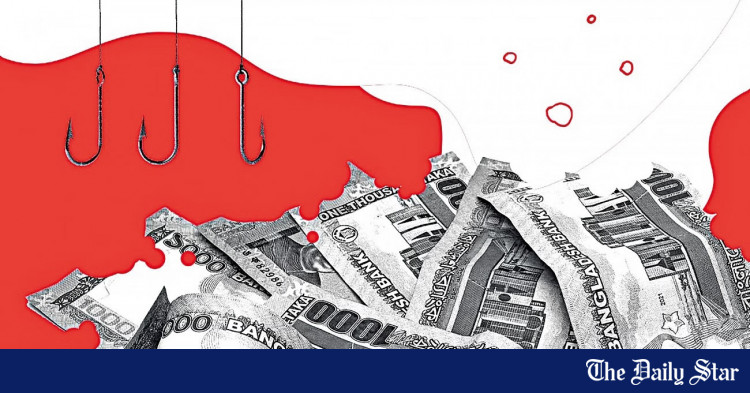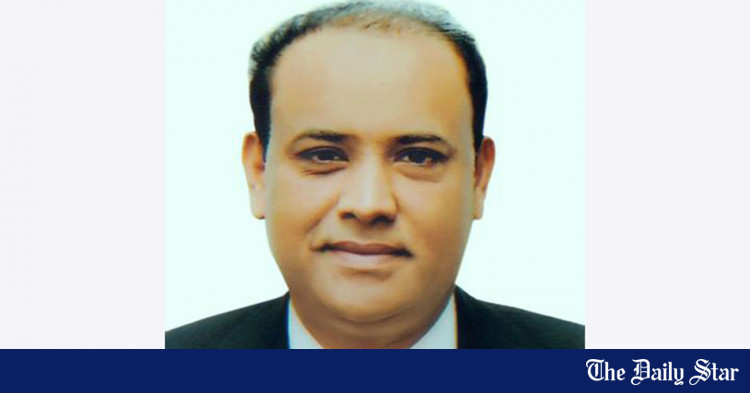Saif
Senior Member
- Joined
- Jan 24, 2024
- Messages
- 17,175
- Likes
- 8,163
- Nation

- Residence

- Axis Group


How Western nations can help Bangladesh reclaim stolen assets
Given the current economic reality of Bangladesh, recovering stolen assets must be a top priority for the interim government.
How Western nations can help Bangladesh reclaim stolen assets

FILE VISUAL: SALMAN SAKIB SHAHRYAR
On August 5, Sheikh Hasina, who ruled Bangladesh for 20 years in total, resigned and fled the country after a student-led mass uprising that emerged out of protests over the controversial government job quota system. During her tenure, the achievements that the country enjoyed have been overshadowed by her increasingly authoritarian governance, characterised by rampant corruption, nepotism, and staggering capital flight.
Several reports from credible national and international sources have revealed how many ministers, high-ranking officials, law enforcement leaders, and politically-connected businessmen syphoned off vast amounts of money. According to a report by Bonik Barta, an estimated $150 billion, equivalent to around Tk 17.6 lakh crore, was illegally transferred abroad during Hasina's tenure. This staggering figure is drawn from findings by US-based think tank Global Financial Integrity (GFI). Much of this illicit capital flowed via inflated government project costs and fraudulent loans from banks. The stolen funds were funnelled into foreign bank accounts or used to purchase real estate in countries like the UK, Canada, Singapore, Malaysia, the UAE, and the US.
One striking example is former Land Minister Saifuzzaman Chowdhury, who amassed a property empire valued at approximately $675 million across the UK, US, Dubai, Malaysia, and Singapore. This vast looting operation epitomises the scale of corruption that characterised Hasina's government.
What is equally striking is the role that Western and other wealthy nations have played—knowingly or unknowingly—in enabling Bangladesh's political elite to stash their ill-gotten gains. For years, these countries have attracted investments from corrupt individuals, often turning a blind eye to the origins of their wealth. The financial systems in these nations provide anonymity and confidentiality. Through the use of shell companies, trusts and offshore accounts, corrupt individuals are able to obscure their identities and move vast sums to these countries with little scrutiny.
Moreover, many financial institutions in these countries fail to conduct due diligence, particularly when dealing with wealthy clients from developing nations. Profits are often prioritised over compliance, allowing dubious transactions to proceed unchecked. This negligence perpetuates global corruption as stolen wealth flows freely into Western economies with minimal oversight.
The complicity of these financial systems highlights a broader issue of accountability. While countries like Bangladesh are frequently criticised for weak governance and corruption, financial institutions in the West play a significant role in facilitating the laundering of illicit funds. By providing safe havens for stolen wealth, these nations not only undermine justice but also deprive developing countries of much-needed resources. These countries must recognise their responsibility in this fight and take meaningful steps to prevent their financial systems from being used as tools for money laundering and illicit wealth accumulation. In doing so, they can help countries like Bangladesh reclaim stolen resources, invest in their future, and improve the well-being of their citizens.
Bangladesh was already facing a series of economic challenges before Sheikh Hasina's departure, including high inflation, slowing remittance and export earnings, dwindling foreign exchange reserves, and high external debt burden. At the end of 2023, the external debt stood at $100.6 billion. According to the Economic Relations Division (ERD), in FY24, foreign loan repayments, including interest and principal amount, was approximately $3.36 billion. This repayment burden is expected to rise to $5.38 billion by 2027. The mounting external debt is placing enormous pressure on the country's already stressed forex reserves.
Given the economic crisis, recovering stolen assets must be a top priority. The international community can play a vital role in these efforts. Cooperation in tracking down and repatriating illicit funds will be critical in helping Bangladesh rebuild and regain control of its economic future.
While stolen asset recovery is undoubtedly complex, it is both feasible and necessary. There are several international laws and conventions that can be used to facilitate the recovery of laundered funds. The United Nations Convention against Corruption (UNCAC) and the Financial Action Task Force (FATF) set global standards for anti-money laundering policies and asset recovery efforts. Additionally, the UN Office on Drugs and Crime (UNODC) and the World Bank's Stolen Asset Recovery Initiative (StAR) support international efforts to recover stolen assets. However, these frameworks rely heavily on the cooperation of international financial institutions, Western governments, and global anti-corruption watchdogs.
Chief Adviser Prof Muhammad Yunus has initiated efforts to recover Bangladesh's stolen wealth by seeking cooperation from Switzerland and technical assistance from the World Bank. With his global influence and strong ties to Western leaders, Yunus is well-positioned to lead the mission to reclaim the billions syphoned off during the Hasina regime.
Recovering these assets would have a transformative impact on Bangladesh's socioeconomic landscape. Billions could be reinvested into critical sectors such as healthcare, education, infrastructure, and social welfare. Moreover, successful asset recovery would not only provide financial relief but also help restore public confidence in government institutions. Holding corrupt individuals accountable would strengthen the rule of law, promote a culture of integrity and transparency, and build greater trust in the country's leadership. While Bangladesh's path to economic recovery is challenging, with Prof Yunus at the helm, backed by his international network and leadership, the recovery of stolen wealth seems within reach.
Abu Afsarul Haider is an entrepreneur.
FILE VISUAL: SALMAN SAKIB SHAHRYAR
On August 5, Sheikh Hasina, who ruled Bangladesh for 20 years in total, resigned and fled the country after a student-led mass uprising that emerged out of protests over the controversial government job quota system. During her tenure, the achievements that the country enjoyed have been overshadowed by her increasingly authoritarian governance, characterised by rampant corruption, nepotism, and staggering capital flight.
Several reports from credible national and international sources have revealed how many ministers, high-ranking officials, law enforcement leaders, and politically-connected businessmen syphoned off vast amounts of money. According to a report by Bonik Barta, an estimated $150 billion, equivalent to around Tk 17.6 lakh crore, was illegally transferred abroad during Hasina's tenure. This staggering figure is drawn from findings by US-based think tank Global Financial Integrity (GFI). Much of this illicit capital flowed via inflated government project costs and fraudulent loans from banks. The stolen funds were funnelled into foreign bank accounts or used to purchase real estate in countries like the UK, Canada, Singapore, Malaysia, the UAE, and the US.
One striking example is former Land Minister Saifuzzaman Chowdhury, who amassed a property empire valued at approximately $675 million across the UK, US, Dubai, Malaysia, and Singapore. This vast looting operation epitomises the scale of corruption that characterised Hasina's government.
What is equally striking is the role that Western and other wealthy nations have played—knowingly or unknowingly—in enabling Bangladesh's political elite to stash their ill-gotten gains. For years, these countries have attracted investments from corrupt individuals, often turning a blind eye to the origins of their wealth. The financial systems in these nations provide anonymity and confidentiality. Through the use of shell companies, trusts and offshore accounts, corrupt individuals are able to obscure their identities and move vast sums to these countries with little scrutiny.
Moreover, many financial institutions in these countries fail to conduct due diligence, particularly when dealing with wealthy clients from developing nations. Profits are often prioritised over compliance, allowing dubious transactions to proceed unchecked. This negligence perpetuates global corruption as stolen wealth flows freely into Western economies with minimal oversight.
The complicity of these financial systems highlights a broader issue of accountability. While countries like Bangladesh are frequently criticised for weak governance and corruption, financial institutions in the West play a significant role in facilitating the laundering of illicit funds. By providing safe havens for stolen wealth, these nations not only undermine justice but also deprive developing countries of much-needed resources. These countries must recognise their responsibility in this fight and take meaningful steps to prevent their financial systems from being used as tools for money laundering and illicit wealth accumulation. In doing so, they can help countries like Bangladesh reclaim stolen resources, invest in their future, and improve the well-being of their citizens.
Bangladesh was already facing a series of economic challenges before Sheikh Hasina's departure, including high inflation, slowing remittance and export earnings, dwindling foreign exchange reserves, and high external debt burden. At the end of 2023, the external debt stood at $100.6 billion. According to the Economic Relations Division (ERD), in FY24, foreign loan repayments, including interest and principal amount, was approximately $3.36 billion. This repayment burden is expected to rise to $5.38 billion by 2027. The mounting external debt is placing enormous pressure on the country's already stressed forex reserves.
Given the economic crisis, recovering stolen assets must be a top priority. The international community can play a vital role in these efforts. Cooperation in tracking down and repatriating illicit funds will be critical in helping Bangladesh rebuild and regain control of its economic future.
While stolen asset recovery is undoubtedly complex, it is both feasible and necessary. There are several international laws and conventions that can be used to facilitate the recovery of laundered funds. The United Nations Convention against Corruption (UNCAC) and the Financial Action Task Force (FATF) set global standards for anti-money laundering policies and asset recovery efforts. Additionally, the UN Office on Drugs and Crime (UNODC) and the World Bank's Stolen Asset Recovery Initiative (StAR) support international efforts to recover stolen assets. However, these frameworks rely heavily on the cooperation of international financial institutions, Western governments, and global anti-corruption watchdogs.
Chief Adviser Prof Muhammad Yunus has initiated efforts to recover Bangladesh's stolen wealth by seeking cooperation from Switzerland and technical assistance from the World Bank. With his global influence and strong ties to Western leaders, Yunus is well-positioned to lead the mission to reclaim the billions syphoned off during the Hasina regime.
Recovering these assets would have a transformative impact on Bangladesh's socioeconomic landscape. Billions could be reinvested into critical sectors such as healthcare, education, infrastructure, and social welfare. Moreover, successful asset recovery would not only provide financial relief but also help restore public confidence in government institutions. Holding corrupt individuals accountable would strengthen the rule of law, promote a culture of integrity and transparency, and build greater trust in the country's leadership. While Bangladesh's path to economic recovery is challenging, with Prof Yunus at the helm, backed by his international network and leadership, the recovery of stolen wealth seems within reach.
Abu Afsarul Haider is an entrepreneur.






































